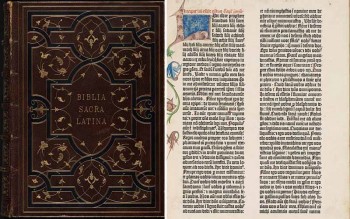The Divine Part of the Bible

Cover and a page of the Gutenberg Bible.
Originally from Great Britain, dating back to 1549, Bible Day is celebrated on the second Sunday in December. In Brazil, it has been celebrated since 1850. The printing of the first copy of the Holy Bible from its Latin version, in 1455, by Johannes Gutenberg (1398-1468), is considered the incunabulum—the book printed in the early beginning of the press with movable types that was not handwritten—that started the mass production process of literary works in the Western world.
Prophecies and Better Times
No other title has ever surpassed the Bible. It is by far the number one bestseller in History.
It is then an opportune time to bring forth some comments I made in volume 3 of O Brasil e o Apocalipse [Brazil and the Apocalypse] (1996).
One of humankind’s major concerns—even for those who deny any interest in the subject—is the imminence of serious spiritual, human, social, political, economic, atmospheric, telluric facts, in addition to successive armed conflicts at the challenging times we are faced with, nuclear ones included. . . . At different times over the millennia, through His emissaries and through Jesus Himself, the Ecumenical Christ, the Divine Statesman, the Prophecies of God have been dragged to a nearly ridicule status due to misunderstanding or partial understanding of their meaning. One of them is the ongoing announcements of the end of the world, which, thank God, were not confirmed, although we know it will happen someday so as a new evolutionary cycle for creatures and the planet starts. Those hasty predictions cause the difficult barriers, to some, to seriously analyze the providential message of the Bible. Despite the sorrows, the Bible has resisted to everything, earthly beings’ flaws included. And it is in the Prophecies, properly understood, that the celestial warning is sheltered, as we see in the Apocalyse19:10: “At this I fell at his feet to worship him. But he said to me, ‘Don’t do that! I am a fellow servant with you and with your brothers and sisters who hold to the testimony of Jesus. Worship God! For it is the spirit of Prophecy who bears testimony to Jesus Christ.’”
The meaning of the Prophecies goes even further. When the Master passed His enlightened lessons on to those listening to Him, He also prophesized as He instructed all how to reach better days in the future.
Valuing God’s Message
We cannot waste time anymore. The signs proving that are everywhere: What is written in the Inviolable Part of the Bible is not an illusion.
Despite the Sidereal Light that comes from such extraordinary text and illuminates the Spirit, some still waste precious time looking for human errors in its content while trying to invalidate God’s message to the nations on Earth.
Now, after centuries of spiritual maturing, why would we have any interest—except for the historical, narrative value—in the human part of the Scriptures, with all the aberrations and violence that depict the animal characteristics that still in our time keep individuals from evolving faster on the pathway to God? Salvation, through the spiritual enlightenment of our conscience, is revealed in their Divine Part.
“The Letter Kills, but the Spirit Gives Life”

Alziro Zarur
In 1985, I highlighted in the press that one should not have a literal reading of the Bible. Alziro Zarur (1914-1979), late Proclaimer of the Religion of God, of the Christ, and of the Holy Spirit, used to warn us that by doing so, many have stopped believing in God! Paul the Apostle taught us in the Second Epistle to the Corinthians 3:6 that “the letter kills, but the Spirit gives life.” Therefore, the Divine Scripture must be studied from the point of view of Fraternal Love, which is the opposite of fanaticism. It must be analyzed in Spirit and Truth, in light of Christ’s New Commandment: “Love one another, as I have loved you. Only by this shall all of you be recognized as my disciples” (the Gospel according to John 13:34-35). Otherwise, we run the risk of using the Holy Book to persecute, oppress, destroy those who do not think as we do. History is flooded with pathological cases of the criminal usage of the great moral authority of the Bible. What explains the use of Holy for this Book is its Divine Message of mercy, generosity, mutual respect, compassion—all that must make up the basis of our daily conduct.

The comments do not represent the views of this site and are the sole responsibility of their authors. It denied the inclusion of inappropriate materials that violate the moral, good customs, and/or the rights of others. Learn more at Frequently asked questions.